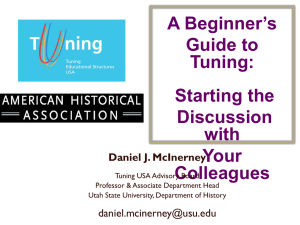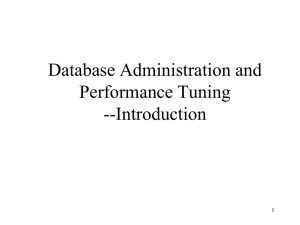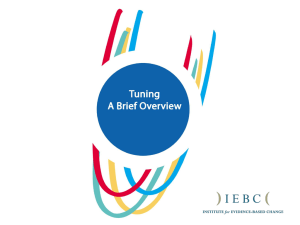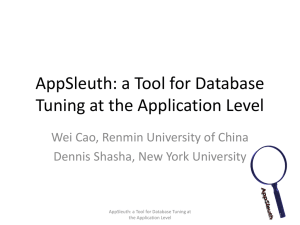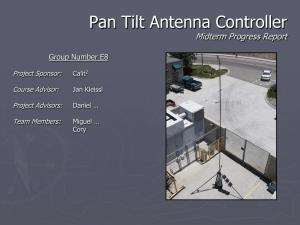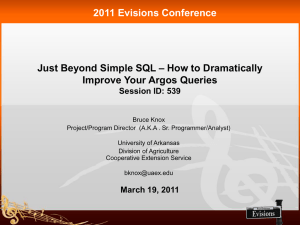How Tuning is making a difference (ppt)
advertisement
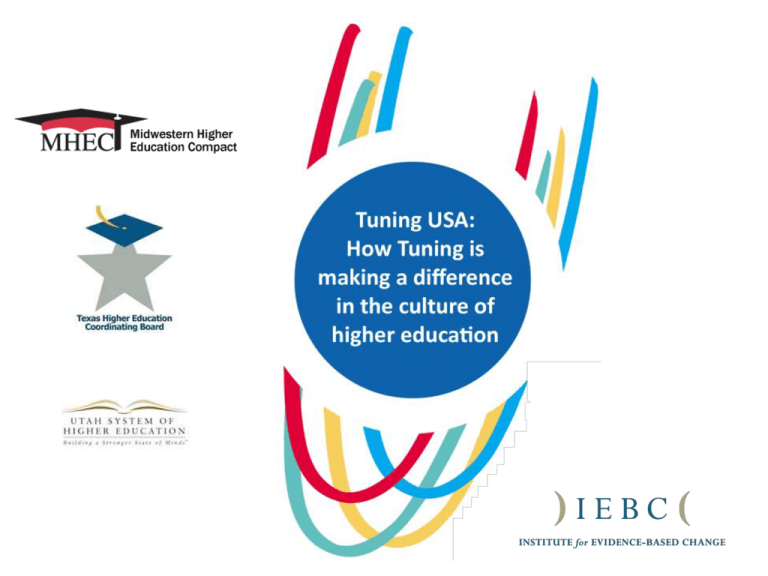
What is Tuning? A collaborative, faculty-driven process that identifies what a student should know and be able to do in a chosen discipline at the completion of a degree by: • Defining areas of competency Master’s Bachelor’s • Identifying learning outcomes Associate’s • Scaling competencies and outcomes to degree level Tuning’s Key Premises • Curricula should not be standardized • Faculty control the discipline • Academic autonomy and flexibility are essential Tuning in the US: 2009-2010 Three pilot states • Indiana • Minnesota • Utah Six initial disciplines • History • Biology • Chemistry • Physics • Elementary Education • Graphic Design Tuning in the US: 2010-2011 Texas • 3 rounds of Tuning Kentucky • Biology • Elementary Education • Business • Nursing • Social Work Regional Tuning in the US: 2011-2013 Midwestern Higher Education Compact (MHEC) National Tuning in the US: 2012-2015 American Historical Association (AHA) Tuning Educational Structures in the US Lumina Foundation initiated Tuning USA to address the foundation’s Goal 2025: Increase the percentage of Americans with high-quality degrees and credentials from 39 percent to 60 percent by the year 2025 Tuning’s Culture of Collaboration • Creates space for innovation—emphasizes that education is about learning, not credit hours • Student-centered degree—emphasizes what students must accomplish over what should be taught • Makes degree-level expectations explicit for students • Assures quality for internal (students) & external (transfer institutions) stakeholders • Synergizes with other educational priorities • Underrepresented populations • Student preparation and success MHEC Cross-State Tuning project Three state project (Illinois, Indiana, Missouri) Why tune across state lines? • Leverage faculty allegiance to the discipline as primary • Identify the challenges involved in Tuning outside of a single state context • Enable faculty to “compare notes” about policies and practices in their individual states Why Illinois, Indiana, and Missouri? • Utilize pilot state experience (Indiana) • Desire for contiguous states (along with Kentucky) • Capture large metropolitan areas with movement of human capital across state lines (Chicago and St. Louis) • Coordinating board states Why is MHEC involved with Tuning? • Consistent with MHEC mission of “Advancing Education Through Cooperation” and related organizational objectives to: • Enhance member states’ ability to maximize higher education opportunity and outcomes • Promote improved student access, affordability and completion • Encourage quality programs and services • Facilitate dialogue among higher education stakeholders to improve higher education policy and practice MHEC Cross-State Tuning project • Why psychology and marketing? • Have not been tuned previously in the U.S. • Among the most popular majors and degree programs (and • • • • a “default” or “fall back” major for many) Programs at the two-year, four-year, and graduate levels (or so we thought) Multiple, varied career/graduate paths Broad range of application of knowledge and developed skills Psychology – among the disciplines most likely to lead to hostile questioning from family members as to what kind of job could possibly be secured with such a major MHEC Tuning Steps • “Pre-launch” meetings with SHEEO agency reps and • • • • • • other key individuals in the three states Involvement of SHEEO agencies, system personnel, and independent associations to identify faculty participants Identification of project evaluator and evaluative framework Opening convening in November 2011 Monthly workgroup meetings January to June 2012 Engage SHEEO agency personnel as supporters and cheerleaders Presentations (with faculty) during state visits and at conferences MHEC Tuning Team Structure Tuning group composition • Fifteen faculty on each disciplinary team (psychology and marketing) – 5 from each state • Tenured or senior faculty engaged in the teaching of undergraduates • Sector representation: o One from a public research university o One from a public comprehensive university o Two from a public two-year degree granting college o One from a private/independent college Progress To Date • Workgroups have completed Steps 1 and 2: • Draft of general/core competencies and learning outcomes for (each) degree level • Draft of discipline specific competencies and learning outcomes for (each) degree level • Mapping of career pathways • The workgroups are now focused on gathering stakeholder feedback on their drafted competencies and learning outcomes Observations and Challenges • Enhanced awareness and heightened respect for colleagues at other types of institutions • Personal enjoyment and professional growth of faculty • Groups need more time to get to know each other before diving into work • Role differences in psychology: researchers vs. clinicians (and APS vs. APA) Observations and Challenges • What to do with existing curriculum and outcomes statements from professional associations (such as the APA) • The associate degree problem • The master’s degree problem! • General/core vs. specific/disciplinary competencies • Appropriate role for SHEEO agencies as well as the project staff (“bottom up” vs. “top down” approach) Post-Secondary Participation in Texas Fall 2011 Total Fall 2011 Public Universities 568,938 Public Two-Year Colleges 752,986 All Health-Related Independent Col. & Univ. Career Colleges Total 23,903 123,690 81,270 1,550,787 What is the Tuning Texas Initiative? • Faculty-driven process; faculty work together across sectors • Includes input from students, graduates, and employers • Focus is first on the discipline, then on courses Documents Faculty Students/ Graduates Employers Programs Tuned/Being Tuned • Tuning 2010 (finalized): • Civil Engineering, Industrial Engineering, Electrical Engineering, Mechanical Engineering • Tuning 2011 (final drafts): • Chemical Engineering, Biomedical Engineering, Biology, Chemistry • Tuning 2012 (forthcoming): • Mathematics, Business, Computer and Information Sciences, Management Information Systems Map of Institutions with Faculty on Texas Tuning Committees Example: Tuning of Civil Engineering • The content of the following slides has been extracted from the May 2011 document, “Tuning of Civil Engineering.” • The full document is available online at: www.thecb.state.tx.us/Tuning_Engineering_in_Texas CE Expertise Profile CE Key Competencies Diagram CE Employment Profile Participants to Date in the Voluntary Course Transfer Agreements Pertaining to Bachelor of Science Degrees in Civil, Electrical, Industrial, and Mechanical Engineering For more information, please visit: http://www.thecb.state.tx.us/tuningtexas Is Tuning Making a Difference in the Culture of Higher Education? The Utah Experience Past and Present • 2009 - History and Physics (associate and bachelor’s) • 2012 - History and Physics (masters and secondary education) - General Education Mathematics - Elementary Education • Common Core State Standards - Degree Qualifications Profile Principle • Faculty Driven (bureaucrats out of way) • Muddling (collaboration) - Time and space for intellectual exploration • Learning is not linear • Add depth and coherence • • • • To what students learn To how students learn To how they demonstrate learning To how we teach Outgrowth of Tuning • Business Innovation Factory • American Historical Association • Convergence with other projects • • Quality Collaboratives (AAC&U) Western Interstate Passport Initiative (WICHE) Next Steps • Integrate into department learning outcomes. • Work more closely with regional, specialized accreditation. • Change conversation from seat time and credit to learning outcomes and competencies. • Introduce Degree Qualifications Profile: - Transparency and coherence in discipline along Essential Learning Outcomes Challenges • Continuity - Faculty change roles - Part-time faculty - Elementary Education - Time • • Learning takes practice Learning is not linear Is Tuning making a difference in the culture of higher education? • Nascent • Too early to make definitive statements • Have Faith! For more information… For more information on Tuning USA, please visit: http://www.tuningusa.org/ For more specific information on the Tuning Texas Initiative, please visit: http://www.thecb.state.tx.us/TuningTexas Tuning USA Guide: http://www.tuningusa.org/Library.aspx


